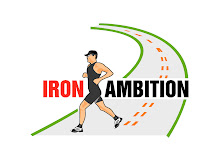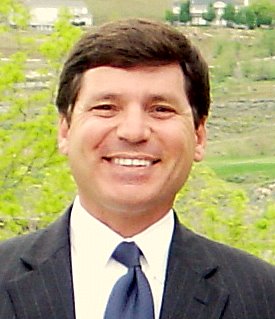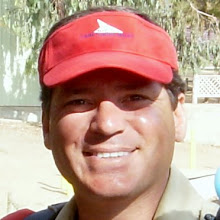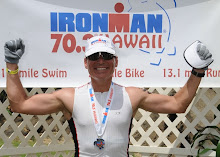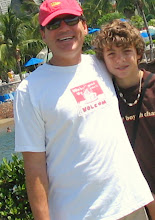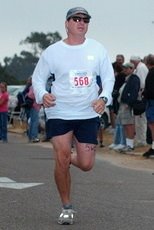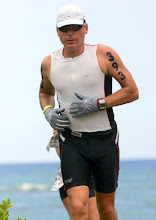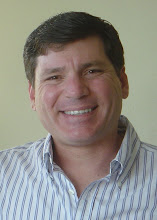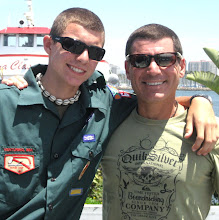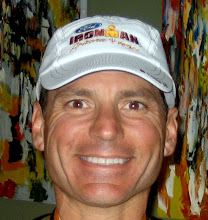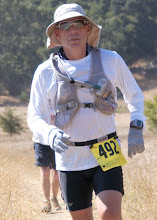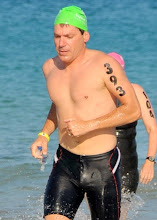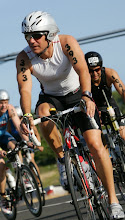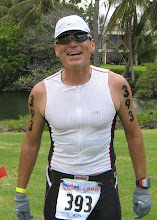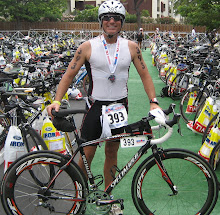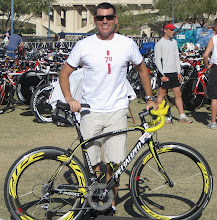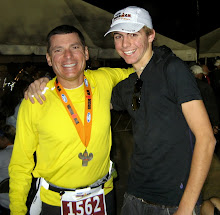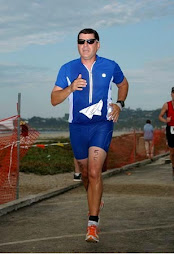I'm thinking about building a simple site to catalogue all the following that I typically have to constantly hunt around for:
Events, Results, Training Plans, Coaches, Camps, News, Equipment and Gear, Ironman.com, Pacing Calculators and Distance Converters, Personal Best Times and Events, Triathlon PodcastsArticles, Tri Clubs, Energy and Nutrition, Books and DVDs, Rentals, Clothing and race gear, Injury/Prevention and Treatment, VO2 Max, Blood Lactate and Chemistry, Sports Massage, Build your own website, Training Tips, Forums, Research, Magazines, Hydration Strategies, Product and Gear Reviews, Classifieds, Getting Aero, Travel and Hotel Bookings, Meal Plans, Retail Stores, Determining your Heart Rate Training Zones,
Some possible links:
http://www.trinewbies.com/http://www.trainingpeaks.com/http://www.powertri.com/http://www.tri-talk.com/http://www.ironman.com/http://www.trisports.com/
Jun 19, 2008
Shaving Legs and Aero Helmets
Aero Helmets:
Yes they do save time. It has been proven time and again, however, the greatest time savings appears to be if one is consistently traveling faster than 20 mph. I'm slow, but am still going aero!
Shaving Legs:
Yes, it is proven that shaving one's legs can save time, but the difference is only fractions of a second to maybe 3 - 5 seconds at the most. It is argued that the more practical reason for shaving legs has to do with a few issues such as: it is easier to clean road rash wounds without having to pick through the mangled leg hair, it is easier and possibly more productive for sports massage without hair, and of course there is a very small margin of time savings in non-wetsuit events and on the bike, but those time savings are very, very slight.
Frankly, there is actually a "coolness factor" for shaving legs. It does prompt questions from non-athletes and it gives you the chance to talk about triathlon! I think that's a very good reason and why I've shorn the leg hair. In fact, I prefer waxing. It is not that painful and if you find a good practioner, it is actually quite relaxing. In between waxings, you can use a simple razor in the shower once a week or so to keep things in check.
Yes they do save time. It has been proven time and again, however, the greatest time savings appears to be if one is consistently traveling faster than 20 mph. I'm slow, but am still going aero!
Shaving Legs:
Yes, it is proven that shaving one's legs can save time, but the difference is only fractions of a second to maybe 3 - 5 seconds at the most. It is argued that the more practical reason for shaving legs has to do with a few issues such as: it is easier to clean road rash wounds without having to pick through the mangled leg hair, it is easier and possibly more productive for sports massage without hair, and of course there is a very small margin of time savings in non-wetsuit events and on the bike, but those time savings are very, very slight.
Frankly, there is actually a "coolness factor" for shaving legs. It does prompt questions from non-athletes and it gives you the chance to talk about triathlon! I think that's a very good reason and why I've shorn the leg hair. In fact, I prefer waxing. It is not that painful and if you find a good practioner, it is actually quite relaxing. In between waxings, you can use a simple razor in the shower once a week or so to keep things in check.
Personal Insights, Opinions and Topics of Interest to Triathletes
Best Times to Workout:
Yesterday (4/13/2008) I got up at 5:30 am and prepared for a long ride down through Laguna Canyon and out onto PCH. Total ride of 65 miles or so. I left the house at 6:30 am. I had done most of the prep work the day and night before, which allowed me to hit the road quickly in the morning. But it is important to keep in mind that it does take at least 30 minutes of prep work before a long ride: Oil chain, check for proper air pressure, prepare/mix bottle of liquid nutrition, fill water bottle, check kit for tubes, air and patch kit, pick out the bibs and shirt, make sure cell phone is charged, plan the route, gather all other stuff I will put in my jersey (credit card, emergency info, cash, GU packets, etc.)
The big news is that leaving my house just after sunrise was an entirely different experience. New sounds, new smells, things look different in the light of daybreak vs. mid-day sun, etc. Also I noticed that on an early Sunday morning, there is far less traffic!! What a pure, unimitigated joy!! I felt much safer. I rode through an area I never knew existed: Little Siagon. WOW! Early morning sites, sounds and smells from this area was very unique, and it is huge, it is not "Little" at all!! It is amazing! It is located in Orange County off Edinger or Bolsa in Westminster I believe. Just incredible.
But the important take-away is that it is much better to:
1. Prepare the night before
2. Leave early morning!!
Aero Bike Frames:
No question that in a wind tunnel, aero bike frames consistently prove that they will save you time on the road; the greatest your race distance, the greater the potential savings. Just be aware that your own body contributes to at least 70% of the aerodynamic drag, and at the most, the bike frame contributes to as much as 30%. You'd be far better to focus on your position than the world's most aero frame!
Yesterday (4/13/2008) I got up at 5:30 am and prepared for a long ride down through Laguna Canyon and out onto PCH. Total ride of 65 miles or so. I left the house at 6:30 am. I had done most of the prep work the day and night before, which allowed me to hit the road quickly in the morning. But it is important to keep in mind that it does take at least 30 minutes of prep work before a long ride: Oil chain, check for proper air pressure, prepare/mix bottle of liquid nutrition, fill water bottle, check kit for tubes, air and patch kit, pick out the bibs and shirt, make sure cell phone is charged, plan the route, gather all other stuff I will put in my jersey (credit card, emergency info, cash, GU packets, etc.)
The big news is that leaving my house just after sunrise was an entirely different experience. New sounds, new smells, things look different in the light of daybreak vs. mid-day sun, etc. Also I noticed that on an early Sunday morning, there is far less traffic!! What a pure, unimitigated joy!! I felt much safer. I rode through an area I never knew existed: Little Siagon. WOW! Early morning sites, sounds and smells from this area was very unique, and it is huge, it is not "Little" at all!! It is amazing! It is located in Orange County off Edinger or Bolsa in Westminster I believe. Just incredible.
But the important take-away is that it is much better to:
1. Prepare the night before
2. Leave early morning!!
Aero Bike Frames:
No question that in a wind tunnel, aero bike frames consistently prove that they will save you time on the road; the greatest your race distance, the greater the potential savings. Just be aware that your own body contributes to at least 70% of the aerodynamic drag, and at the most, the bike frame contributes to as much as 30%. You'd be far better to focus on your position than the world's most aero frame!
My Workout Schedule
I work out for 9 - 15 hours a week. But preparing for the workouts, dressing, changing, mixing various concoctions of energy drinks, planning my routes for the runs and bike rides, maintaining my gear and recording all of my results takes at least as much time. So the weekly commitment is closer to 20 – 25 hours.
I work out six days each week. Adding the preparation and pre-workout planning to each day’s workouts means that I must allocate about 3 – 4 hours per day, depending on the workout.
Some days, such as the weekends, involve significant time commitments to complete a 75 mile bike session or a 13 mile run. Almost every workout involves training in multiple disciplines, and quite often three different workouts in a single day.
Despite my best intentions of working out after business hours, the facts are that I have learned time and again that my best chances of completing a workout is if I start them first thing in the morning. Trying to set time aside in the evening is very risky because legitimate things unexpectedly pop up: every day. Also, one can have a tough day, be wiped out and really not be in the mood at all to work out.
It is far better to get up earlier and just do it.Having said that, I do not always get my workouts done in the mornings. Often, my workouts require a break between them, so there is no way to get them done at one time. On most days, I work out in the morning, and the evening.
My training includes: running, cycling, swimming, weightlifting and various drills, core exercises and stretching. Training also requires plenty of sleep 7 - 8 hours, the occasional nap on the weekends (I should do this more often, but don't), proper diet and nutritional supplements, and sports massage. The risk of injury increases when muscles are not as pliable and flexible, and thus the need for consistent sports massage. This isn't a spa treatment; in fact it's often quite painful!
I work out six days each week. Adding the preparation and pre-workout planning to each day’s workouts means that I must allocate about 3 – 4 hours per day, depending on the workout.
Some days, such as the weekends, involve significant time commitments to complete a 75 mile bike session or a 13 mile run. Almost every workout involves training in multiple disciplines, and quite often three different workouts in a single day.
Despite my best intentions of working out after business hours, the facts are that I have learned time and again that my best chances of completing a workout is if I start them first thing in the morning. Trying to set time aside in the evening is very risky because legitimate things unexpectedly pop up: every day. Also, one can have a tough day, be wiped out and really not be in the mood at all to work out.
It is far better to get up earlier and just do it.Having said that, I do not always get my workouts done in the mornings. Often, my workouts require a break between them, so there is no way to get them done at one time. On most days, I work out in the morning, and the evening.
My training includes: running, cycling, swimming, weightlifting and various drills, core exercises and stretching. Training also requires plenty of sleep 7 - 8 hours, the occasional nap on the weekends (I should do this more often, but don't), proper diet and nutritional supplements, and sports massage. The risk of injury increases when muscles are not as pliable and flexible, and thus the need for consistent sports massage. This isn't a spa treatment; in fact it's often quite painful!
My Coach and Equipment
My Coach:
I am very priviledged to be working with the world's leading researcher on Tri-Specific training issues, the #1 Podcaster and incredible coach for triathlon, David Warden.
We share a very strong interest in researching the facts and numbers and science of training. David works very closely with Joe Friel, the father of all Triathlon training and the author of nearly all leading Tri-specific training books, including the best selling Triathlete's Training Bible.
Our Relationship:
David is not a cheerleader coach, rather, his coaching is based on science and tracking the data.Recording the Workouts:I record every run with a heart rate monitor and GPS (Garmin Forerunner 405). The pace, HR, distance and all other relevant data is forwarded to David every day. I record every bike workout with a PowerMeter (Powertap 2.4 wireless by CycleOps). The watts produced by my cycling, along with my cadence, heart rate, speed and all other data, are recorded and sent to David for detailed analysis. Progress is monitored and tracked. New workouts are developed based upon my recent results.
My swim workouts take place in my Endless Pool (www.EndlessPools.com). This is a 9' x 12' above ground pool with an extremely powerful hydraulic motor that creates a current of up to 3 mph. I swim in this current like a salmon swimming upstream. I typically swim at about 2 - 2.25 mph in this pool, but I don't know how that will equate in open water. It's an incredible piece of engineering and we also use the pool on the weekends as a huge hot tub/spa. The pool was extremely expensive, and in hindsight, may not have been worth the expense. But I will say that it is definitely better than a lap pool because there are no walls to kick off; you are swimming in the current the entire time.
While I have some of the world's finest bikes and equipment, it won't make me any faster; speed is up to me.
I am very priviledged to be working with the world's leading researcher on Tri-Specific training issues, the #1 Podcaster and incredible coach for triathlon, David Warden.
We share a very strong interest in researching the facts and numbers and science of training. David works very closely with Joe Friel, the father of all Triathlon training and the author of nearly all leading Tri-specific training books, including the best selling Triathlete's Training Bible.
Our Relationship:
David is not a cheerleader coach, rather, his coaching is based on science and tracking the data.Recording the Workouts:I record every run with a heart rate monitor and GPS (Garmin Forerunner 405). The pace, HR, distance and all other relevant data is forwarded to David every day. I record every bike workout with a PowerMeter (Powertap 2.4 wireless by CycleOps). The watts produced by my cycling, along with my cadence, heart rate, speed and all other data, are recorded and sent to David for detailed analysis. Progress is monitored and tracked. New workouts are developed based upon my recent results.
My swim workouts take place in my Endless Pool (www.EndlessPools.com). This is a 9' x 12' above ground pool with an extremely powerful hydraulic motor that creates a current of up to 3 mph. I swim in this current like a salmon swimming upstream. I typically swim at about 2 - 2.25 mph in this pool, but I don't know how that will equate in open water. It's an incredible piece of engineering and we also use the pool on the weekends as a huge hot tub/spa. The pool was extremely expensive, and in hindsight, may not have been worth the expense. But I will say that it is definitely better than a lap pool because there are no walls to kick off; you are swimming in the current the entire time.
While I have some of the world's finest bikes and equipment, it won't make me any faster; speed is up to me.
Labels:
Coaching,
equipment,
recommended gear,
Tri Coach,
tri equipment,
tri gear
Why do an Ironman?
I really don't know anyone who has a good answer for this; I sure don't.
I suppose the appeal is that many claim this to be the most challenging one-day endurance event on the planet;very few people have ever attempted this event, even fewer have completed it. Bragging rights might be part of the reason we all do it.
Sometimes, even just yesterday (4/13/08) I tell myself that it is not even worth it, and that there is no way possible that I can complete an Ironman.
These thoughts creep into my head when I am hot, tired, in pain, fighting stomach problems, sunburn, completely spent and exhausted and my knees and legs are aching. This happens a lot during long workouts, typically on the bike or on a run.
For example, yesterday I rode through Laguna Canyon on a 65 mile ride. I had been up most of the night before with a stomach ailment and was really dehydrated. I did the ride anyway. No excuses. But that ride really took a toll. When I got home I tried to do a brick (bike-run combination workout) and run off the bike to simulate what I will have to do in the Ironman.
No way. Not gonna happen today!
I barely got across the street over to the golf course and I literally collapsed under the shade of a tree and just laid down for 3 minutes...right there in plain view of all the passing cars on PCH! I couldn't help it. I was totally spent.
I was absolutely exhausted and had nothing left in the tank. I slowly got up, and walked home, surely with my head held low in defeat and disgust. How was I ever going to do a full Ironman? I couldn't even do half the bike distance and jog three blocks! In November, I will have to ride 112 miles and immediately follow that with a 26.2 mile marathon. There's just no way!
I took a shower and went to bed at 11:30am and did not wake up until about 4:00pm. It took about 24 hours to get back to feeling OK again. I chalk this up to some food poisoning. The amount of dehydration must have been severe because I had horrible headaches, the chills and did not use the bathroom for nearly 15 hours, despite drinking a massive amount of fluids.
The point here is that had this been on Ironman race day, would I have been able to finish, and if so, at what cost? I cannot conceive of how I would have possibly finished in that condition. Even when I am in peak condition, I cannot imagine doing this entire distance.
Is it worth the time, expense, physical toll, pain and struggle?
Somehow, somewhere deep inside, there is a compelling drive to complete this endeavor. To see it through.
Perhaps just one time.
But certainly at least once.
I suppose the appeal is that many claim this to be the most challenging one-day endurance event on the planet;very few people have ever attempted this event, even fewer have completed it. Bragging rights might be part of the reason we all do it.
Sometimes, even just yesterday (4/13/08) I tell myself that it is not even worth it, and that there is no way possible that I can complete an Ironman.
These thoughts creep into my head when I am hot, tired, in pain, fighting stomach problems, sunburn, completely spent and exhausted and my knees and legs are aching. This happens a lot during long workouts, typically on the bike or on a run.
For example, yesterday I rode through Laguna Canyon on a 65 mile ride. I had been up most of the night before with a stomach ailment and was really dehydrated. I did the ride anyway. No excuses. But that ride really took a toll. When I got home I tried to do a brick (bike-run combination workout) and run off the bike to simulate what I will have to do in the Ironman.
No way. Not gonna happen today!
I barely got across the street over to the golf course and I literally collapsed under the shade of a tree and just laid down for 3 minutes...right there in plain view of all the passing cars on PCH! I couldn't help it. I was totally spent.
I was absolutely exhausted and had nothing left in the tank. I slowly got up, and walked home, surely with my head held low in defeat and disgust. How was I ever going to do a full Ironman? I couldn't even do half the bike distance and jog three blocks! In November, I will have to ride 112 miles and immediately follow that with a 26.2 mile marathon. There's just no way!
I took a shower and went to bed at 11:30am and did not wake up until about 4:00pm. It took about 24 hours to get back to feeling OK again. I chalk this up to some food poisoning. The amount of dehydration must have been severe because I had horrible headaches, the chills and did not use the bathroom for nearly 15 hours, despite drinking a massive amount of fluids.
The point here is that had this been on Ironman race day, would I have been able to finish, and if so, at what cost? I cannot conceive of how I would have possibly finished in that condition. Even when I am in peak condition, I cannot imagine doing this entire distance.
Is it worth the time, expense, physical toll, pain and struggle?
Somehow, somewhere deep inside, there is a compelling drive to complete this endeavor. To see it through.
Perhaps just one time.
But certainly at least once.
What is an IRONMAN?
The IRONMAN consists of two trademarked triathlon events: the 70.3 (the "half") and the full Ironman.
The full Ironman consists of a 2.4 mile open water swim followed by a 112 mile bike leg and concludes with a 26.2 mile marathon run. These events are run consecutively and always occur in the same swim-bike-run order. The athletes must complete the entire event within a prescribed time frame, or they will be eliminated. The full Ironman has a 17 hour cutoff time for the 140.6 mile event.
Each leg of the Ironman event is timed and if a participant fails to meet the cutoff times, they will not be permitted to continue in the race.
Many people claim that the Ironman is far and away, the most challenging one-day endurance event on the planet. Ultra-marathoners may debate that fact; that's why I aim to complete both of these endurance benchmarks.
Training for an Ironman takes an incredible amount of time and it has been documented that there is a 90% injury rate for those who attempt this distance. To make the Ironman more accessible, the organizers recently developed the 70.3 event, which is exactly half the distance of the full Ironman.
There is great ongoing debate as to whether one is a "real Ironman" if they complete the 70.3 and not the full Ironman. Many hard core triathletes agree that until you've completed a full Ironman, the full 140.6 miles, you are not a real Ironman.
The spirit of the event, the spirit of the challenge is to complete the entire 140.6. By means of an absurd example, if a participant in the full Ironman only swam half the distance, only rode the bike for half the distance and ran only a half marathon instead of the full marathon, they would NEVER say that this person was an Ironman. Therefore, the argument goes, how can we really say that a finisher of a 70.3 is a real Ironman?
Technically, I do suppose a reasonable argument exists that one is a real Ironman if they complete a sanctioned, Ironman-trademarked event. But to me, I will never consider myself worthy of the Ironman title until I finish the full 140.6 event in an Ironman sanctioned and trademarked event. Period.
I have completed two sanctioned, Ironman-trademarked events: the Hawaii 70.3 and the Vineman 70.3 in Sonoma, CA. I completed these less than sixty-days apart. But I do not believe for a moment that I am an "Ironman" and I bristle at that recognition because I don't feel that I have yet earned it.
I believe it would be disrespectful for me to accept that title when so many other dedicated athletes of all ages have sacrificed so much more than I have and endured far more hardships in terms of time away from family and the physical toll to complete the training necessary to complete this remarkable event.
If and when I complete the full Ironman 140.6, I will proudly wear that accomplishment and distinction for the rest of my life. And it will mean all the more, and be all the sweeter knowing that I earned every bit of it.
The full Ironman consists of a 2.4 mile open water swim followed by a 112 mile bike leg and concludes with a 26.2 mile marathon run. These events are run consecutively and always occur in the same swim-bike-run order. The athletes must complete the entire event within a prescribed time frame, or they will be eliminated. The full Ironman has a 17 hour cutoff time for the 140.6 mile event.
Each leg of the Ironman event is timed and if a participant fails to meet the cutoff times, they will not be permitted to continue in the race.
Many people claim that the Ironman is far and away, the most challenging one-day endurance event on the planet. Ultra-marathoners may debate that fact; that's why I aim to complete both of these endurance benchmarks.
Training for an Ironman takes an incredible amount of time and it has been documented that there is a 90% injury rate for those who attempt this distance. To make the Ironman more accessible, the organizers recently developed the 70.3 event, which is exactly half the distance of the full Ironman.
There is great ongoing debate as to whether one is a "real Ironman" if they complete the 70.3 and not the full Ironman. Many hard core triathletes agree that until you've completed a full Ironman, the full 140.6 miles, you are not a real Ironman.
The spirit of the event, the spirit of the challenge is to complete the entire 140.6. By means of an absurd example, if a participant in the full Ironman only swam half the distance, only rode the bike for half the distance and ran only a half marathon instead of the full marathon, they would NEVER say that this person was an Ironman. Therefore, the argument goes, how can we really say that a finisher of a 70.3 is a real Ironman?
Technically, I do suppose a reasonable argument exists that one is a real Ironman if they complete a sanctioned, Ironman-trademarked event. But to me, I will never consider myself worthy of the Ironman title until I finish the full 140.6 event in an Ironman sanctioned and trademarked event. Period.
I have completed two sanctioned, Ironman-trademarked events: the Hawaii 70.3 and the Vineman 70.3 in Sonoma, CA. I completed these less than sixty-days apart. But I do not believe for a moment that I am an "Ironman" and I bristle at that recognition because I don't feel that I have yet earned it.
I believe it would be disrespectful for me to accept that title when so many other dedicated athletes of all ages have sacrificed so much more than I have and endured far more hardships in terms of time away from family and the physical toll to complete the training necessary to complete this remarkable event.
If and when I complete the full Ironman 140.6, I will proudly wear that accomplishment and distinction for the rest of my life. And it will mean all the more, and be all the sweeter knowing that I earned every bit of it.
Labels:
complete ironman,
ironman definition,
why compete,
why run
Subscribe to:
Comments (Atom)

